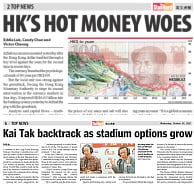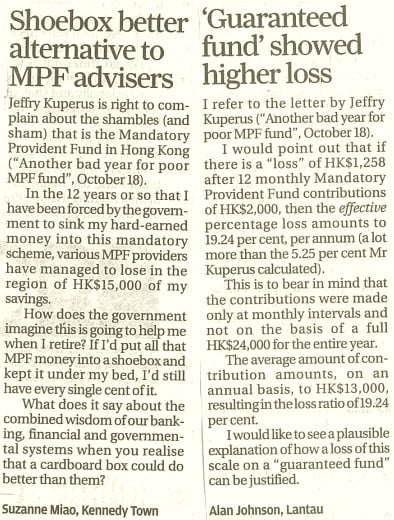As the property and stock markets show, Hong Kong is on the receiving end of a wave of hot money. The inflow is mostly due to quantitative easing in the big, debt-crippled economies, possibly augmented, some think, by Japanese capital fleeing the hostile Mainland. And the Yuan is strengthening against the dollar, pushing up prices of food imported from over the border, and increasing incentives for Shenzhen residents to come over and hoover up everything on the shelves in Sheung Shui stores.
If Alan Greenspan at the Federal Reserve from 1987-2006 was too stupid to see or do anything about his mega-bubble, what hope is there for Hong Kong, where our leaders are hardly more competent, and anyway have given the Fed control of our monetary policy? The pressure rises another notch. Even more, the poor find the cost of essentials rising, the lower middle class battle for space and goods with Mainlanders, and the bourgeois see their dream of home ownership slipping  away. A few people will do well out of this (if they are not too greedy or unlucky with timing), but, to quote Craig Stephen, “…too many people are unable to join the liquidity party. Much depends on whether Hong Kong’s unelected leaders are prepared to govern for more than just the top 1%.”
away. A few people will do well out of this (if they are not too greedy or unlucky with timing), but, to quote Craig Stephen, “…too many people are unable to join the liquidity party. Much depends on whether Hong Kong’s unelected leaders are prepared to govern for more than just the top 1%.”
The potential for serious crisis (say, at least 2003-scale) is that much greater. Meanwhile, Chief Executive CY Leung and his team seem overwhelmed. In their desperation to announce additional home-building capacity, they have proposed scrapping the Kai Tak sports stadium white elephant, backtracked in the face of vested interests, and now started muttering about increasing residential area at the South West Kowloon cultural hub. As if the 250,000 empty apartments in town don’t exist. As if there isn’t a grossly distorted market, leading to property prices that make fair economic value a fiction.
Is CY going to unleash a flood of new housing stock at just the wrong time, as he did in the late 1990s when then-CE Tung Chee-hwa followed his advice to build 85,000 units a year? Or is he just pretending he will do so, in the hope that the bubble naturally deflates in some way in the meantime? (Does he, or anyone, fully grasp all the long-term implications and contradictions here? For example, the non-landed middle class want housing to be cheaper so they can afford to buy – on the understanding that prices will subsequently double or treble in value again.)
And what about the affordability of food for the poor? (If speculators start hoarding rice, will CY respect their property rights and leave them alone as well?) And what about the Mainland tourists and traders swamping the trains, streets and shops?
Some people have plentiful disposable income, own their home and don’t live in areas teeming with tourists. But they too are coming along with another problem for CY and his team. They are starting to notice that the Mandatory Provident Fund is the anti-matter of savings schemes. It’s supposed to give you more than you would otherwise have for retirement – it actually gives you less. Columnist Jake van der Kamp discussed it yesterday, while two South China Morning Post readers give us the benefit of their opinions about this fraud/theft/not-merely-legal-but-compulsory mugging… 
The good news for CY is that Hong Kong’s opposition pro-democrats, who could be triggering rebellion and revolution in this climate if they felt minded to do so, are instead fighting to get welfare for billionaire tycoons like Li Ka-shing. Even so, it must be getting pretty hot in the government kitchen.

I remember the last property crash, and the one before that. Couldn’t possibly happen again, could it ?
Joe, all things economic follow cycles, so its just a matter of time. This is ceteris paribus and doesnt take into account an already inflated mainland housing market.
I had to laugh at the ‘threat’ that athletes will protest in a street march. It looks like following the success of Scholarism, this will become the threat du jour. Strange that in all the discussion about the need for more housing, nothing was said about the shopping centre/cruise terminal/flats that will also occupy a massive part of the site.
You can always tell when somewhere is going downhill. The people start talking about property prices with horror tinged with a curious pride and elation, in the sense that they believe they are millionaires rather than victims of the market. They believe that if you just buy a flat and sit on it, you can become rich. Such boring conversations used to be my main reason for staying away from Britain.
Before the Asian Financial Crisis, there was a similar attitude. People opened shops all over Hong Kong, stocking them with tasteless Italian junk and thinking people would buy it. The magic of Hong Kong: buy a shop lease, sit back and collect.
Then the bailiffs arrived and there were only court orders fluttering in the breeze.
But what greater entertainment is there in the world than to see Capitalism in one of its last crises? It keeps me going. I love it. What is especially fascinating is that Capitalism is not only an economic system in Hong Kong, it is a religion. Two birds with one stone.
Cheers!
http://www.rthk.org.hk/rthk/news/englishnews/news.htm?all&20121011&56&875613
From Oct 11…
The Financial Secretary, John Tsang, says the launch of the third round of quantitative easing, QE3, in the United States has not had any direct impact on local real estate, despite recent increases in property prices.
Now that it’s an issue, everybody blames QE3 but says zip about…
http://rthk.hk/rthk/news/efinance/news.htm?efinance&20121014&56&876106
China’s broad measure of money supply, known as M2, rose 14.8 percent last month compared to the same period last year, up from 13.5 percent in August.
and comments from CY’s committee of housing supply
http://www.scmp.com/news/hong-kong/article/1045299/demand-mainland-buyers-key-new-long-term-hk-housing-strategy
“Times have changed. We cannot ignore their demand and have to consider how to accommodate their needs – provided they are genuine needs,” said Wu, a former director of buildings. “We have to do a survey to find out how many of them buy a home for self-use, how many for long-term investment and for speculation. We also need to take into account those who come regularly for short stays.”
The fact that CY has signaled that he will not make housing more affordable in HK means that investors can be assured a one-way bet on HK property as an investment which is a great draw for the mainland’s bubbling M2, which dwarfs anything Bernanke and Greenspan implemented.
The whole MPF con pisses me off more than most things and I am quite happy at business ‘networking’ parties to give to give it both barrels should someone proffer me their business card which reveals they are in on it.
Now after 12 years of this they have revised the scheme where you can choose which provider to rip you off – but only your portion! The employer must keep control of their 50% lest there be any problems deducting from their portion any minuscule severance payment you maybe owed should you become unfortunate enough to be laid off.
How and why this has escaped our Legislative Councillors is sadly all too familiar.
And surprised Hemlock wants to spend lots of HK government dollars on setting up a bureaucracy to track the assets of HK’s old people. Maybe the sandwich demographic between Li Ka-shing and $190,000 in assets should hide their nesteggs in foreign shell corporations like Scrooge McCY’s Sec of Development. (200,000 is less than 10 months of mean HK salary and would only provide 4 years at $4000/month, which is pretty frugal living even if zero is going to housing and 4 years is less than the time to go from 65 to the HK government’s magic age of 70. Scrooge McCY loves to see old folks destitute before he’s willing to give ’em a hand out.)
And it upsets me that the government under the “auspices of public information” can run advocacy spots for their political positions while the opposition cannot. And Chugani’s interview with Matthew Cheung this last Sunday on this issue was pathetic.
The longer we wait for the inevitable crash, the greater it will be, although QE3 and CY’s timorous tinkerings may easily put it off for another while.
I still wonder about the last-but-one debacle: did the colonial government say apres moi le deluge, or did Peking get the timing disastiously wrong, hoping that the edifice would start crumbling in about May 1997?
SHIT BUGGER FUCK
The MPF is the biggest con-trick in the world .
The $ I have per-forced had to contribute over the past 12-odd years ( which was the absolute minimum, based on my salary) and invested in THE most conservative of funds (bonds, fixed interest etc) are now worth less than than if I had put the money under my mattress ( and a helluva lot less than if I had exchanged HK$ for RMB every month : HK$100 now = RMB0.795 – the first time the RMB has ever dropped below the 0.800 level )
MPF, like national insurance and other sundry scams invented to bribe a war-weary working population into signing up for another world war, is simply a form of tax. Anything you actually get back at the end of it all should come as a welcome surprise rather than as an expected return.